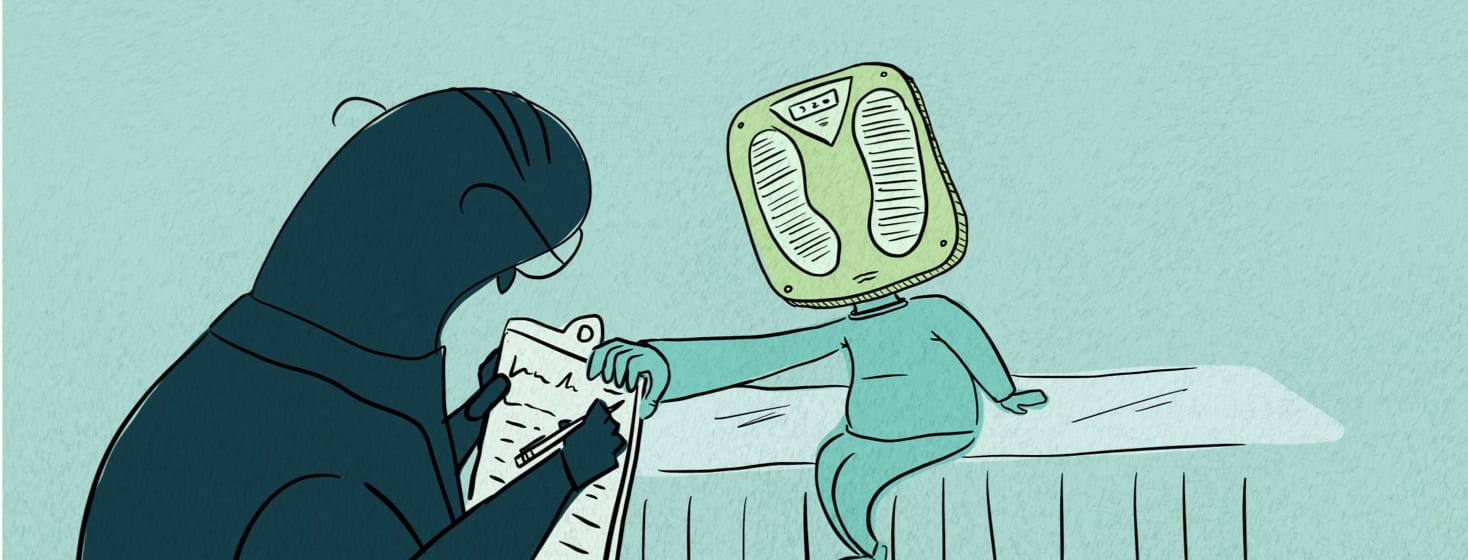Doctors and Obese Me
"A little anorexia won't kill you." I remember the moment my childhood doctor said that to me. I was 15 years old and had a really bad ear infection. I was wearing a black and white striped top that made me feel very French and chic. All I could do was laugh and agree with him. What else could I do? I was a bit overweight and was aware that being fat was not acceptable. I accepted his words and kept them with me.
I would pull out that sentence many times when I met with doctors. It was a way to break the ice. I thought if I addressed the elephant in the room (which healthcare professionals would believe was me) I would be seen as a good patient. My joke would catch them unaware. The "humor" would show that I knew that I had a health issue that was more important than what I was there to be seen for. Weight was their obsession and it started with the scale.
The number on the scale
Most of us are familiar with a routine medical procedure: the scale. Before we are led to the actual healthcare office, we are stopped and asked to get on the scale. Our weight is dutifully recorded for posterity and weaponized for the visit. If you are like me, stopping to get weighed is like going through security.
I take off all heavy jewelry. I empty my pockets of change and car keys. If my shoes are not light, I take them off as well. Any item that might add weight is dumped. With the new digital scales, each ounce counts. I expected that my current weight would be the lead off batter for this medical inning.
The magic number on the scale had the power to determine in what direction the examination would go. If the number was smaller than the one from the previous visit, then all would go well. I would be praised and then asked what it was that had brought me there. If that number edged up or stayed the same, we might never get a chance to fully discuss the purpose of my appointment. Study after study shows that obese patients are viewed so poorly that some medical professionals resent treating obese patients because of the negativity attached to being excessively overweight.1
All because I am obese
Through my experiences, I have come to believe that most of the medical community sees obesity as a primary disease to be treated before anything else. It is the key that unlocks a world of medicine, conventional and complementary. It is the single physical characteristic about which, for all intents and purposes, any type of medical professional can diagnose and suggest treatment for me on sight. It is assumed to be at the root of nearly all of my medical issues. If a patient is fat, we need to treat the fat.
Even if the problem is unrelated to obesity, dropping poundage is the fix. Treat the fat and whatever the issue may be, losing weight will cure it all. Acne will disappear by losing weight. Excessive mosquito bites happened because the insects were attracted to my fat self because I supposedly sweated a lot. While he did not blame my multiple sclerosis on obesity, I did have a neurologist ask why I did not consider gastric bypass. This was before uttering a single word about my chronic illness.
How I am advocating for my health
More times than I want to count, I have felt like waving my hands in front of the faces of my doctors. I wanted them to see me, not just look at me. When they looked at me they only saw a heavy body with jiggly fat that did not need to be so jiggly and so fat. They saw a person who needed help with weight. They did not see a patient in search of help and answers. I wanted them to see my inherent worth as a person, the qualities that extend far beyond conventional notions of physical attractiveness. My cure was always on the plate, regardless. That was until I decided that I was going to have to be the one to change.
With the courage that came from research and the exhaustion at poor treatment, at my next visit, I said no to stepping on the scale. As confidently as the physician assistant led me to the scale, I glided past it and declined the opportunity. My doctor had no new weight to compare to the old one. I was expecting pushback or at least a question about why I skipped the scale. For some unknown reason I did not get either. That non-threatening encounter grew my confidence. It led me into learning about advocating for my health and wellbeing.
I had found my voice and I was going to throw my weight behind it.

Join the conversation